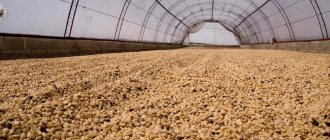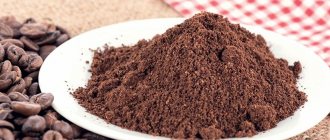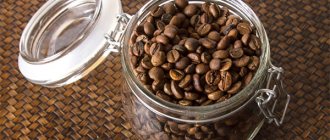Let's talk about humanity's favorite drink - coffee. More precisely, what kind of coffee should you buy in the store: beans or already ground?
The question seems simple, but there is a mystery here. Have you noticed that coffee of the same brand in a 250 gram package, but in different states costs differently. For example, ground coffee costs 150 rubles, and the same coffee beans costs 300 rubles. Why such difference? The weight is the same.
The benefits of ground coffee
Contrary to expert claims, the finished powder has its own consumer advantages. And they are so significant that a huge proportion of coffee lovers prefer to buy a product that has already been ground by the factory. It's convenience and price.
Not every kitchen is equipped with a coffee machine. This means you will need a coffee grinder for grinding. And these are hands and precious time, especially in the morning. Making coffee from ready-made powder is faster and easier. If there is a critical lack of time, the powder can be brewed directly in a cup. Some “prepare” the drink this way all the time. Coffee simply poured with boiling water is absolutely devoid of taste and chemical value.
The question of whether ground coffee or beans is more profitable should be answered in more detail. Let's support the answer with a little analysis. All data is from one trading portal to avoid inaccuracies. The same brands and varieties are taken as a basis, but in a different release form.
| Name | Cereal, price, rubles per 250 g | Ground, price, rubles per 250 g |
| Paulig Presidentti | 220 | 225 |
| Paulig Classic | 215 | 212 |
| Lavazza Qualita Oro | 320 | 305 |
| Lavazza Qualita Rossa | 290 | 250 |
| Jardin Dessert Cup | 190 | 165 |
| Jardin Espresso di Milano | 170 | 169 |
Conclusion: whole grain is more expensive than ground grain, sometimes significantly more. We should think about the reasons for this difference. After all, grinding is an additional stage of processing, which, logically, should increase the cost of production. It turns out that the manufacturer can reduce the cost of the product due to third-party impurities. It is unlikely that famous factories do this. But there is still a potential risk when purchasing. And this is a smooth transition to the disadvantages of the powder.
Coffee substitute - chicory
I remember how, as a child, my neighbor Baba Valya constantly cooked some kind of mud in a Turk. At that time I was sitting next to her, drinking cocoa with gingerbread and did not understand how I could pour this strange-looking dark liquid into myself. Having matured and become wiser, I remembered Grandma Valya and appreciated her serious and responsible approach to my health.
Chicory root has a beneficial effect on reducing blood glucose levels, normalizes pancreatic function, increases blood pressure and dilates blood vessels. For patients with diabetes, chicory is a real salvation, since it can replace both sugar and starch. The coffee drink made from chicory has a pleasant taste and aroma. It is also a safe alternative to coffee for pregnant women, as it has a calming effect. The drink made from chicory with milk is especially good. To prepare it, just heat the milk and add a spoonful of chicory and sugar.
Disadvantages of ready-made grinding
Industry experts say that 15-20 minutes after grinding, coffee gradually “dies.” Those who are distrustful are asked to conduct an experiment. You need to grind some coffee and leave it open. After a few hours, grind the same grains and compare the aromas. They promise an incredible difference! And that's just the hours. And after a couple of days, the fact that coffee beans are better than ground coffee leaves no doubt.
A drink made from such a powder will have a neutral odor and a rancid taste. The reason is the volatility of essential oils. When interacting with oxygen and moisture, the product loses its beneficial properties.
How quickly the powder loses its aroma and valuable characteristics depends on two factors: grinding and storage conditions. The finer the grind, the faster the oils will evaporate and external odors will be absorbed. Sealed packaging partly saves coffee from quickly “dying.” It is taboo to keep the product open or in a transparent container. A paper bag, wooden or ceramic container with a tight lid is best. You can also store coffee in a “original” vacuum bag with a good lock.
Laziness is the mother of knowledge
Until recently, driven by my laziness, I bought ground immediately. But, drinking mug after mug, I began to notice that the coffee was somewhat thin. And the grinding of the grain itself is either too coarse, or some kind of ballast substance is mixed in there. In general, something is wrong.
But one day I ran out of ground coffee, and I had to look in the bins, where I found the remains of beans. Having ground the grain into a fairly fine powder, I began to fill the cone. When filling, it turned out that the grind was wet, compacted well and stuck together, while the ground was dry. The coffee preparation time has also increased significantly. While ground coffee takes 5 minutes to brew, coffee from beans that I compacted too hard took 30 minutes to brew.
After pouring coffee into a mug, I discovered that the coffee became more viscous. Marks remain on the walls of the white mug for a long time, while the ground coffee quickly flows back. Let's try...
Why coffee should be a bean
The coffee fruit is a storehouse of valuable chemical elements, securely hidden under a hard shell. In particular, these are essential oils that are responsible for the incomparable aroma of the finished drink. Some components are responsible for your favorite taste, others for the vigor that a long-awaited cup gives.
- This is interesting: Why coffee invigorates
When the grain is opened, much less crushed, this entire noble bouquet gradually begins to evaporate. And this is provided that the product is not subjected to any other processing at the factory. The strictest secrecy of production leaves the consumer only to hope for the purity of the composition. So, is ground or bean coffee still a valid question?
With grains everything is very clear. These are whole raw materials that do not allow dishonest goods. Low-quality coffee, crushed chicory and more are mixed into the inexpensive powder composition. You can recognize unclean contents by the smell and unpleasant taste of the finished drink.
- Don't miss: Which is healthier, coffee or chicory
The financial benefits of factory grinding are also very questionable, if you look at it. 250 g of whole berries will yield more cups of coffee than the same volume of crushed packaging. Freshly ground grain will “open up” better and impart more flavor and aroma to the water. This means you will need less per cup.
Experts unanimously assure that it is better to buy coffee beans and grind them yourself. A serving is for one time, you cannot stock up, or the homemade ground delicacy, just like the store-bought one, will lose all its pleasant properties. When an electric coffee grinder is running or a manual one is spinning, the whole room smells of natural grain. The anticipation of tasting makes your favorite drink even tastier!
Coffee: pros and cons
Until now, the opinions of doctors are very contradictory. Some, based on research, claim that your favorite invigorating drink is harmful to the heart, nerves and, possibly, other organs. Others vehemently deny this.
Such conflicting opinions are generally understandable: after all, of the proposed 2000 substances included in coffee, less than half are known, not to mention the fact that the physiological effect has not been studied. And people's individual reactions are very different.
In terms of its chemical composition and its stimulating effect, the main substance containing coffee - caffeine - has been best studied. Caffeine primarily affects the human central nervous system.
Depending on the dose, it increases the pumping (blood emission) of the heart through the heart muscle, speeds up breathing and metabolism in general. Caffeine also stimulates kidney activity and increases the amount of urine produced. Blood vessels dilate, blood supply to all organs improves.
The blood vessels in the brain constrict and blood pressure temporarily rises.
The effect of caffeine is harmless for a healthy person, and even desirable for hypotensive people - people with low blood pressure. In addition, when drinking coffee systematically, the body seems to adapt to it, and blood pressure no longer rises. A complete abstinence from drinking coffee is now not necessarily recommended even for heart patients. A study conducted at the Harvard Institutes of Health (USA) found no relationship between drinking caffeinated coffee and an increased risk of heart attack or stroke. The paradoxical result of the study was that drinking “decaffeinated” coffee is associated with a greater risk of heart disease.
However, before the delight caused by the results of Harvard research that were beneficial for coffee and the heart had died down, a new trouble arose. In Scandinavia, coffee was found to increase blood fat levels. True, this statement is not new, but previously it was interpreted differently. Since people who drink coffee and have high blood cholesterol levels are often also heavy smokers, it was assumed that caffeine and nicotine interact to increase blood cholesterol levels. True, this relationship has not yet been completely refuted, but the “blame” of caffeine has weakened.
This suggests that harmful substances are contained in coffee sediment. It is very likely that we are talking about the numerous fatty substances (lipids) and fat solvents contained in coffee beans. This was confirmed by one Dutch study. Experimental patients were served pure coffee lipids as dessert. The patients' blood pressure immediately rose.
Smarter thanks to coffee?
What sleepyhead doesn’t know that coffee invigorates a person and spurs his thoughts? And during the day it defeats drowsiness and promotes the emergence of new creative forces.
However, in people who are painfully nervous or suffering from depression, in a particularly tense situation or in physical mental exhaustion, drinking too strong coffee can cause the exact opposite effect: nervous absent-mindedness, escape of thought, and internal restlessness. Therefore, in stressful situations, when you are very tired or exhausted, do not drink a lot of coffee.
Stomach problems
Sometimes, for some coffee lovers, a cup of this aromatic drink turns out to be literally poison and causes heartburn, stomach pain, diarrhea or hepatic colic. Along with caffeine, these phenomena are caused by irritating substances formed when coffee beans are roasted - various acids, especially chlorogenic acid, which is typical for coffee. Therefore, people with a sensitive gastrosystem are recommended to use special coffee, the processing technology of which is aimed at removing as many substances that irritate the stomach as possible.
Many consider the small black from the south “Espresso” and its brother “Cappuccino” to be especially useful. The reason, apparently, is that for Expresso blends, along with soft Arabica, acid-poor Robusta varieties are used. In addition, coffee is roasted longer and at a higher temperature (about 250 degrees C), as a result of which some of the acids are removed from the coffee beans.
However, what is problematic for some is just what is needed for most, especially after a sumptuous meal. Substances contained in coffee stimulate the secretion of gastric juice and bile, promote better absorption of fatty foods, and improve intestinal functioning.
Coffee and alcohol
The thesis that coffee supposedly reduces alcohol intoxication is just a beautiful legend. On the contrary, drinking hot water increases the absorption of alcohol. In addition, a drunk person creates the illusion of vivacity. Finally, coffee increases the morning hangover as it contributes to the dehydrating effect of alcohol.
Main varieties
Strictly speaking, there are many varieties of coffee plants as such - more than 90, however, one of the two most popular ones, or both at once, ends up in our cup - Arabica and Robusta.
The most common coffee varieties are Arabica and Robusta.
Arabica
Arabica beans are easy to distinguish by sight, taste and smell. They have an elongated, oblong shape, a crack in the middle resembles the letter “S”, and the surface is smooth. The taste is soft, rich with slight sourness, the aroma is bright and persistent. Arabica coffee accounts for 70% of the world's coffee grown and consumed.
Robusta
Robusta coffee beans are slightly smaller than Arabica, round in shape, with a straight crack in the middle. They contain 2 times more caffeine than the first grade, but less of everything else - taste and aroma in particular. It costs less, so it is often used in mixtures (blends) and instant coffee. But it is even advisable to make espresso coffee with the addition of robusta, as thanks to it it turns out stronger and has a good crema.
Comparative table of properties of Arabica and Robusta
On the package, the manufacturer usually writes the type of coffee beans it contains. It can be 100% Arabica, or a mixture of Arabica-Robusto (50/50, 60/40 or 70/30). Sometimes there is pure robusta or something completely unknown - there is not a word about the composition on the packaging. In this situation, you just have to decide for yourself “risk is a noble cause” or “trust, but verify,” and if it is impossible to verify, then don’t buy.











